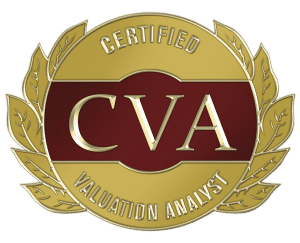Business Valuation Service
Fealty does business valuations, New Zealand wide, for the purpose of selling or buying a business, divorce, gifting etc. There are three different prices for three different engagement types:
1) Value-Only
2) Consulting
3) Conclusion of Value
In essence, the different services are based on different levels of required explanation and therefore time to complete the report.
Each service collects information and analyses the data. It is the writing of the report and discussion of the findings that determines the hours spent on completing a business valuation project.
Business Valuation Service Type Video


Bruce McGechan is a Certified Valuation Analyst®. The CVA® designation shows the business, professional, and legal communities that recipients have met the rigorous standards of professionalism, expertise, objectivity, and integrity in the field of business valuation, financial consulting and litigation, and related consulting disciplines. The Certified Valuation Analyst® (CVA®) designation is the World’s premiere valuation credential awarded by the National Association of Certified Valuation Analysts.
Service Types
Conclusion of Value
A Conclusion of Value engagement is a formal valuation, comprehensive and lengthy report. It takes 8-10 weeks and may be used for disputes that may end up in court such as divorce or shareholder disputes. It fully complies with the National Association of Certified Valuators and Analysts (NACVA) standards, which is important for a legal dispute.
The ultimate reader of the report is the judge, the opposing lawyer and their valuer, yourself and your lawyer. This requires a lengthy report with footnotes and appendices following the National Association of Certified Valuation Analysts (NACVA) Professional Standards for a detailed valuation report.
Consulting Engagement
A Consulting engagement is a quicker, lower priced, less comprehensive but efficient way to value a business. It takes about 3-4 weeks. It is used by amicable parties wanting to understand what a business is worth, perhaps to sell the business to another shareholder or a third party, or as part of an amicable divorce process. It would not be used in litigation.
The Consulting Engagement describes the business valuation process and how the estimate of the value was arrived at. But the engagement doesn’t need to write the report ready for litigation nor follow the NACVA detailed reporting standards.
A Consulting agreement is done remotely, while a Conclusion of Value requires a site visit and director meetings.
Value-Only
In the case of the Value-Only engagement, only the business owner or investor is the reader, they just require an estimate of value, not the description of how the value was arrived at including the analysis sections and post-report meetings. The valuer still looks at similar information but doesn’t need to spend time explaining the valuation.
There is complexity in arriving at a business value but here is a simplification of that process.
Business Valuation Process
There are three valuation approaches: the asset approach (adjusted net asset method), the income approach (discounted cash flow and capitalization of earnings methods), and the market approach (private and public comps). The valuer considers the applicability of the three approaches and applies the relevant methods.
The valuer follows a structured process usually starting with the analysis of financial statements. Financial statements are adjusted to exclude any unusual or one-time revenues or expenses, ensuring the resultant data reflects the sustainable and recurring profitability of the business.
Under the income and market approach, the valuer selects a future benefit stream, usually net cash flow to invested capital. We calculate this from either the historical accounts or projected earnings.
Under the income approach, a capitalization or discount rate is calculated and applied. A popular method is the Build-Up Method which calculates and sums the risk-free rate, equity risk premium, size premium, industry risk premium, and company-specific risk premium to arrive at the capitalisation rates. We divide the benefit stream by the discount/cap rate to calculate business value.
We may also need to adjust for control and marketability. This uses discounts for lack of control (DLOC) and lack of marketability (DLOM).
Having applied these discounts we have the business equity value.
For a more detailed explanation see my article Business Valuation in New Zealand.
Business Valuation Service
To enquire about a business valuation please fill in the form below.
Value Only Engagement
-
Business Value
-
Time: 1 week
-
Income approach
-
Asset approach
-
If applicable, Market approach (small business only, extra fee* of about $250+gst)
-
Report length: 1-2 page letter
* Only if similar transactions can be found (probably not).
Consulting Engagement
-
Value Only engagement scope and:
-
Time: 3-4 weeks
-
Report length: about 40 pages
-
Financial analysis section
-
Risk analysis section
-
Discount and Premium Adjustment section
-
Phone or video calls with key directors
-
Post report video meeting to discuss
Expedite fee: $750 for quickest possible service.
Conclusion of Value Engagement
-
Consulting engagement scope and:
-
Time: 8-12 weeks
-
Report length: about 150 pages
-
Market approach (SME & large business)
-
Industry and economic analysis
-
Company history and description
-
Extensive appendices
-
Litigation ready
-
Site visits required
-
Director meetings required
-
Post report meeting with clients and client's lawyer
-
Best for litigation, companies with $20+ million of revenue, or listing on an exchange
Expedite fee: $2000 for quickest possible service.

